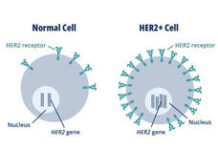Findings from the American Association for Cancer Research Project Genomics Evidence Neoplasia Information Exchange (GENIE) registry show that KRASG12C somatic mutations are present in non-small cell lung cancer (NSCLC), colorectal cancer, appendiceal and small bowel cancers, and cancers of unknown primary site, with a mutation frequency of 3 to 14%. Among patients with NSCLC and colorectal cancer, female patients harboured significantly more KRASG12C mutations than male patients. Findings are reported on 14 January 2021 in The New England Journal of Medicine.
The GENIE team searched the distribution of KRASG12C mutations in 32,138 patients with 10 cancer types across race and sex. In total, 2045 patients (6.4%) were Asian, 2355 (7.3%) were Black, and 27,738 (86.3%) were White.
KRASG12C mutations were identified in 1867 samples, most frequently in patients with NSCLC, 1443 of 10,444 (13.8%); 74 of 2105 patients with cancer of unknown primary site (3.5%), 12 of 368 patients with appendiceal cancer (3.3%), 234 of 7402 patients with colorectal cancer (3.2%), and 7 of 223 patients with small-bowel cancer (3.1%).
Among patients with NSCLC, White and Black patient groups were enriched for KRASG12C mutations more than Asians (White patients 13%, Black patients 10.9%, Asian patients 3.6%; p < 0.001).
The GENIE researchers found differences by sex within the same ethnic groups of patients with NSCLC. KRASG12C mutations occurred more often in White female patients than in White male patients with NSCLC (odds ratio 1.4; 95% confidence interval [CI] 1.3 to 1.6; Q < 0.001) and more often in Asian male patients than in Asian female patients (odds ratio 5.2; 95% CI 1.9 to 17.9; Q = 0.01).
Among patients with colorectal cancer, White female patients were enriched for KRASG12C mutations more than White male patients (odds ratio 1.4; 95% CI 1.1 to 1.9; Q = 0.04).
The authors underlined that their data illustrate differences according to sex and ethnic group in the prevalence of KRASG12C mutations in various cancer types and emphasized the importance of mutation analysis of larger numbers of non-White populations and in rare cancers. With the promising efficacy of sotorasib, recruiting patients with cancer types enriched with KRASG12C somatic mutations in future clinical studies will be important.
Reference
Nassar AH, Adib E, Kwiatkowski DJ. Distribution of KRASG12C Somatic Mutations across Race, Sex, and Cancer Type. N Engl J Med 2021; 384:185-187.






